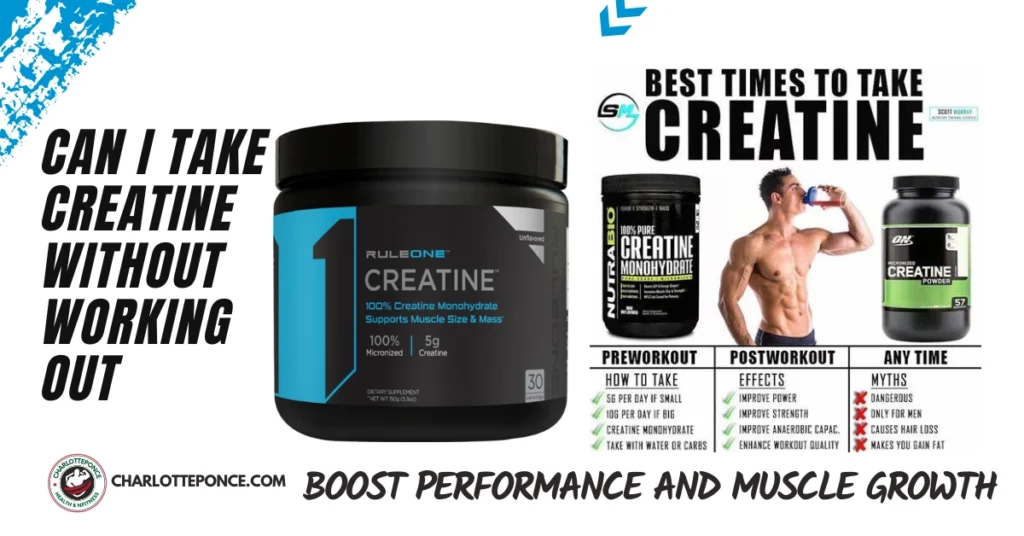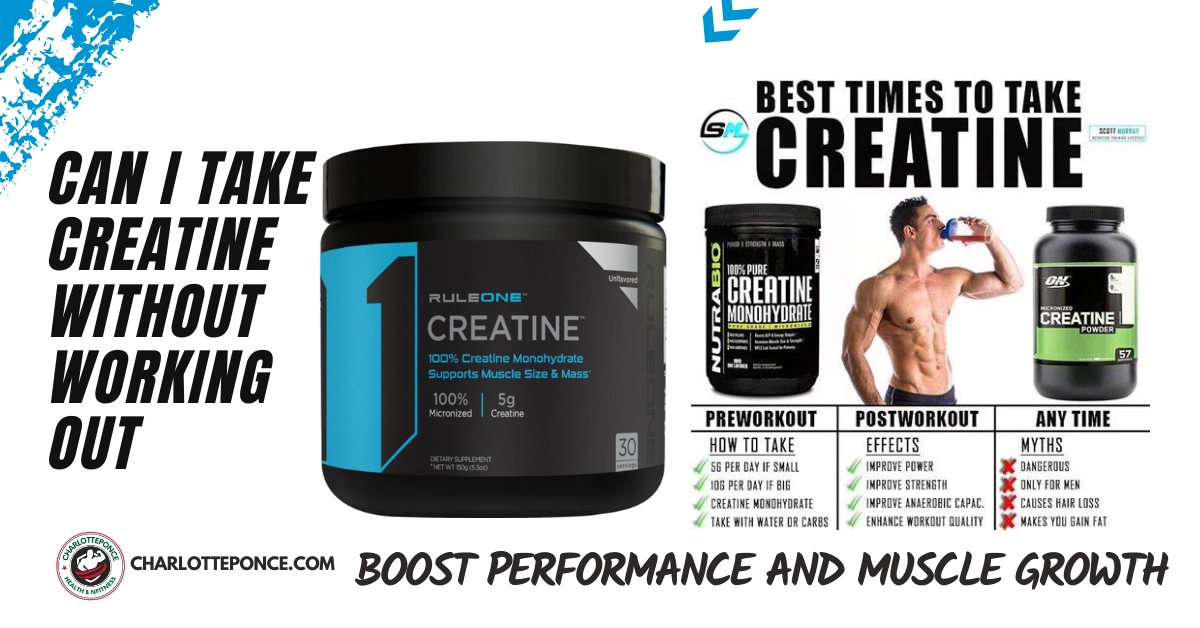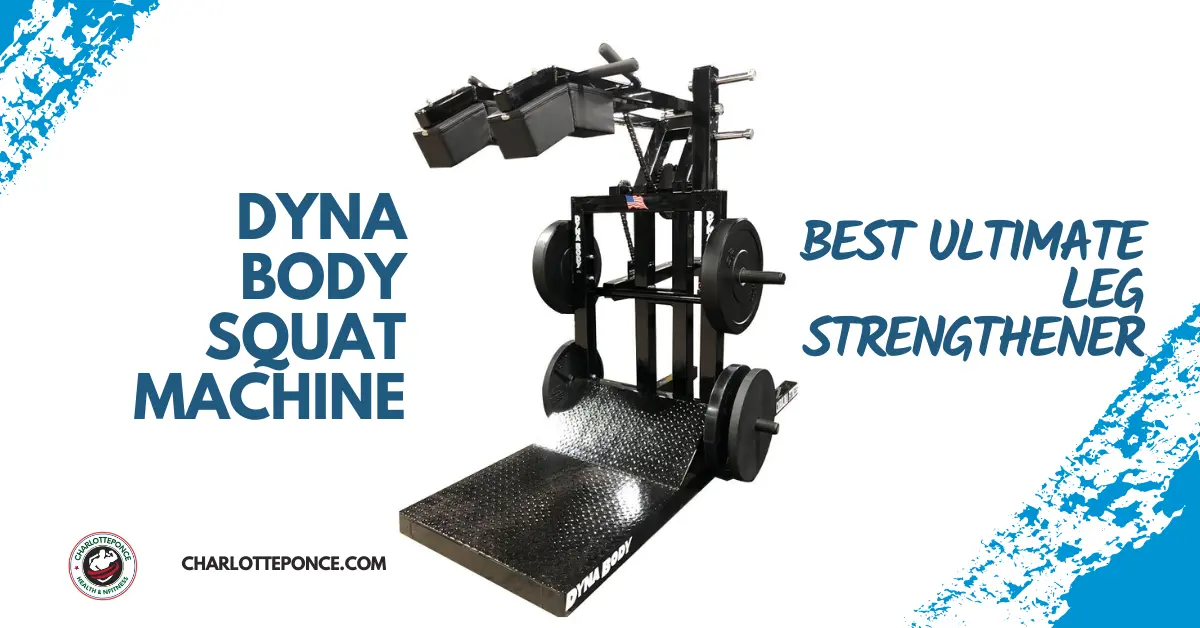Can I Take Creatine Without Working Out? This post explores if creatine supplementation can boost performance and muscle growth even if you don’t work out. While you can take creatine without working out, its main benefits are seen when used in conjunction with exercise. Creatine can still support overall health, but its muscle-building effects are best realized through physical activity.
If you take creatine without working out, you may still experience some benefits such as improved cognitive function and overall well-being. However, to maximize its potential for increasing muscle strength and size, incorporating regular exercise into your routine is essential.
Taking creatine without working out may not yield the same noticeable muscle-building results as when used in combination with physical activity. Understanding how to best utilize creatine for your specific health and fitness goals is crucial for optimal results.

Page Contents
ToggleWhat Is Creatine?
Creatine is a popular supplement used to boost muscle strength and performance. While it’s typically taken by athletes and fitness enthusiasts, some people wonder if they can take creatine without working out. Taking creatine on rest days can help maintain consistent levels in the body and support muscle recovery and cognitive function.
- Creatine is a natural substance found in muscle cells, playing a crucial role in energy production during high-intensity exercise.
- This supplement is commonly used to enhance athletic performance, increase muscle mass, and improve strength.
Benefits Of Creatine
- Increased muscle energy production: Creatine helps regenerate adenosine triphosphate (ATP), the primary energy carrier in cells, enabling muscles to perform better during short, intense bursts of activity.
- Improved muscle recovery: By supporting the replenishment of ATP stores, creatine may aid in faster muscle recovery after workouts.
Risks And Considerations
- Dehydration risk: Creatine may draw water into muscle cells, potentially leading to dehydration if not enough water is consumed.
- Gastrointestinal issues: Some individuals may experience digestive problems like bloating or cramping when taking creatine.
How Creatine Works
- Creatine works by increasing phosphocreatine levels in muscles, allowing for more rapid ATP production, particularly beneficial for activities requiring short bursts of intense energy like weightlifting or sprinting.
- By enhancing the availability of ATP, creatine can support muscle contraction, resulting in improved exercise performance.
Myths About Creatine
- Creatine causes water retention: While initial weight gain may occur due to increased water content in muscles, this does not mean it leads to overall weight gain.
- Creatine is only for bodybuilders: Creatine can benefit a variety of athletes and individuals looking to enhance their exercise performance, not exclusively bodybuilders.
By understanding what creatine is and how it works, individuals can make informed decisions about incorporating this supplement into their wellness routine.
What Does Creatine Do In Our Bodies?
Taking creatine without working out can still provide benefits, as it enhances energy production in the muscles, aiding in maintaining muscle mass and recovery. Although it’s ideal to take creatine before or after exercise, continuous supplementation can still support cognitive function and muscle recovery on non-workout days.
Creatine is a natural compound that plays an essential role in energy production within our body. Its primary function involves providing energy to our muscles during high-intensity activities or exercises.
- Creatine supplementation aids in increasing phosphocreatine stores in our muscles, thereby enhancing the regeneration of adenosine triphosphate (ATP), the primary energy currency in the cell.
- It also contributes to muscle cell volumization, which leads to improved muscle hydration and increased muscle size.
- Additionally, creatine has been shown to support cognitive function and may have neuroprotective properties, benefiting the brain.
Creatine serves as a valuable resource for athletes and individuals engaging in high-intensity workouts, aiding in energy production and muscle strength. Its role in promoting muscle hydration and potential cognitive benefits makes it a compound worth considering for various health and fitness-related goals.
Does Creatine Provide Any Additional Health Benefits, Besides Performance Improvement?
“Taking creatine without working out can still provide benefits by supporting muscle cell saturation and overall supplementation effects. While exercise enhances creatine utilization, consistent intake helps maintain muscle recovery and cognitive functions. “
- Creatine supplementation has been associated with several health benefits beyond just performance enhancement.
- Studies suggest that creatine may have positive effects on brain health and function.
- Additionally, creatine has shown potential in improving symptoms in neurological diseases and mental health conditions.
- Some evidence also indicates that creatine may aid in the treatment of certain muscular and neuromuscular diseases.
- Creatine has demonstrated antioxidant properties, possibly contributing to overall health and well-being.
How Much Creatine Does The Body Produce In A Day?
The body naturally produces around 1-2 grams of creatine per day. While it’s generally recommended to take creatine before or after exercise, you can still take it on non-workout days to maintain consistent levels in your body, which can support muscle recovery and cognitive function.
Creatine is a naturally occurring compound in the body that plays a vital role in energy production, particularly during short-duration, high-intensity activities. When considering the body’s ability to produce creatine daily, it raises questions about whether supplementing with creatine without working out is beneficial or necessary.
Let’s delve into how much creatine the body generates in a day.
- The average adult body produces about 1-2 grams of creatine per day primarily in the liver, kidneys, and pancreas.
- This endogenous creatine production contributes to around half of the body’s total creatine stores.
- The remaining creatine required by the body is obtained from dietary sources rich in creatine, such as red meat and fish.
Creatine supplementation aims to increase the body’s creatine stores beyond what can be achieved through dietary intake alone. Understanding the body’s natural creatine production provides insights into the potential benefits of supplementing with creatine, even in the absence of regular exercise routines.
Does Creatine Make You Bloated?
Creatine does not make you bloated, and you can take it without working out. It’s best to take creatine shortly before or after exercise for optimal results. However, taking creatine consistently on non-workout days can help support muscle recovery and cognitive function.
Creatine is a popular supplement known for its muscle-building benefits. However, one concern that many people have is whether or not it can cause bloating. Let’s explore this topic further to gain a better understanding.
- Creatine does cause water retention in the muscles, which can make you feel a bit bloated. However, this is not the same as bloating in the digestive system.
- The water retention is actually a positive effect as it helps to hydrate the muscles and improve their performance.
- The bloating sensation is temporary and usually subsides once your body adjusts to the creatine supplementation.
- To minimize any discomfort, it is recommended to stay well-hydrated and spread out your creatine intake throughout the day.
- Some individuals may be more prone to bloating with creatine than others, but it is generally a mild and temporary side effect.
Other Potential Side Effects Of Creatine:
While bloating is a common concern, it’s important to note that there are a few other potential side effects associated with creatine use. These can include:
- Weight gain: Creatine supplementation may cause an increase in body weight due to water retention and improved muscle mass.
- Upset stomach: Some individuals may experience stomach discomfort or digestive issues when taking creatine.
- Muscle cramps: In rare cases, creatine may cause muscle cramping, especially if you are not properly hydrated.
Tips To Reduce Bloating:
If you’ve experienced bloating from creatine or want to minimize the chances of it occurring, here are a few helpful tips:
- Stay hydrated: Drinking plenty of water can help alleviate bloating and improve the absorption of creatine.
- Split your dosage: Instead of taking a large dose of creatine all at once, try splitting it into smaller doses throughout the day.
- Take it with food: Taking creatine with meals can help reduce the bloating sensation.
- Start with a lower dose: If bloating is a concern for you, consider starting with a lower dose and gradually increasing it over time.
Remember, it’s always best to consult with your healthcare professional before starting any new dietary supplement, including creatine. They can provide personalized advice based on your individual needs and health status.
While creatine can cause water retention and a temporary bloating sensation, this is a minor side effect compared to its potential benefits for muscle growth and athletic performance. By following the recommendations mentioned, you can help minimize any discomfort and maximize the effectiveness of creatine supplementation.
Does Creatine Help You Gain Weight?
While taking creatine without working out may not lead to weight gain directly, maintaining consistent creatine levels can aid in muscle recovery and support overall muscle health. It is essential to understand that creatine supplements work best when combined with a regular exercise routine to maximize benefits for muscle strength and performance.
Creatine is often associated with weight gain due to its ability to increase water content in muscle cells. However, it is important to note that this weight gain is not due to an increase in body fat, but rather increased muscle mass.
Here are a few key points to consider regarding the relationship between creatine and weight gain:
- Increased water content: Creatine supplementation leads to an increase in water content within muscle cells, which can contribute to weight gain. This is a temporary effect and does not result in long-term weight gain.
- Muscle mass increase: Creatine aids in increasing muscle mass by enhancing strength and performance during workouts, allowing for more intense and effective training sessions. This, in turn, can lead to muscle growth and weight gain in the form of lean muscle mass.
- Individual response: The extent of weight gain experienced with creatine supplementation varies between individuals. Factors such as genetics, diet, exercise regimen, and dosage can influence the magnitude of weight gain.
- Balanced diet: To ensure optimal results, it is important to maintain a balanced diet while taking creatine. This includes consuming adequate protein and calories to support muscle growth.
- Regular exercise: While creatine can contribute to weight gain, it is most effective when combined with regular resistance training. Exercise helps to maximize the muscle-building benefits of creatine and supports overall body composition.
While creatine supplementation can contribute to weight gain, it is primarily due to increased muscle mass rather than body fat. Incorporating creatine into a balanced diet and exercise routine can help individuals enhance their athletic performance and potentially gain lean muscle mass.
Can Creatine Make You Tired?
While taking creatine without working out may not directly lead to feeling tired, it may not provide the same benefits as when combined with exercise. However, maintaining consistent creatine levels in the body can still support muscle recovery and overall well-being, even on non-workout days.
Creatine, a popular supplement known for its muscle-building benefits, is often questioned for its effects when not paired with regular physical activity. In this segment, we will explore the impact of creatine on energy levels and whether it can lead to fatigue.
- Creatine supplements are typically not attributed to causing tiredness on their own.
- Creatine works by increasing ATP levels in muscles, providing energy for high-intensity activities.
- Studies suggest that creatine may enhance cognitive function and reduce fatigue, potentially leading to improved energy levels.
- If inadequate hydration accompanies creatine intake, it may contribute to perceived fatigue.
Considerations For Taking Creatine Without Working Out
- Creatine can still offer benefits even if you’re not engaging in regular exercise.
- While muscle gain may be limited, creatine’s potential cognitive and energy-enhancing effects can still be experienced.
- Adequate hydration and a balanced diet should be maintained to optimize creatine’s benefits.
- Consult with a healthcare professional before starting any supplementation regimen, especially if not engaging in physical activity.
By understanding how creatine functions in the body and its implications on energy levels, individuals can make informed decisions about its use, even when not actively working out.
Frequently Asked Questions Of Can I Take Creatine Without Working Out
Is It Ok To Take Creatine Everyday?
Taking creatine everyday is generally safe and beneficial for muscle recovery and cognitive function. Whether or not you work out, consistent use is important to maintain creatine levels in the body. However, its full benefits are derived when combined with physical training to increase muscle strength and performance.
When Should I Take Creatine If I Don’t Work Out?
You can take creatine on rest days with food for best results, even if you don’t work out.
Can I Take Creatine If I Skip Gym?
Taking creatine without working out may not provide the desired benefits. Creatine helps improve muscle strength and mass, so if your goal is to enhance your physical performance, it is recommended to continue taking creatine even when you are not able to go to the gym.
However, if you are not concerned about muscle gains and don’t have any specific fitness goals, it may not be necessary to take creatine without working out. Ultimately, the decision depends on your individual goals and circumstances.
Does Creatine Build Muscle Without Lifting?
No, creatine does not build muscle without lifting. Creatine only increases energy production in the muscles, but without training, it cannot be utilized for building strength and performance.
Conclusion
If you’re considering taking creatine without working out, remember consistency is key for benefits. While it won’t directly build muscle, maintaining creatine levels could aid recovery. Understand your goals and body to decide if continuing supplementation during rest days is beneficial.
Prioritize overall wellness for long-term success.







